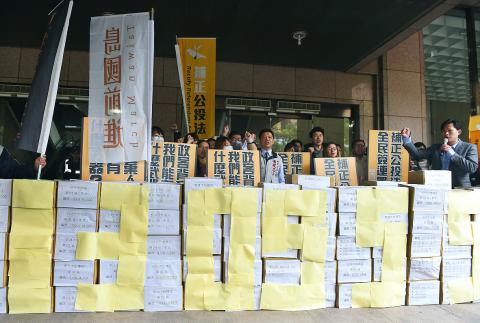Youth activist group Taiwan March yesterday submitted its petition to reform the much-maligned Referendum Act (公民投票法), following a seven-month campaign in which scores of grassroots volunteers canvassed across the nation.
The petition garnered about 130,000 signatures — well past the threshold of 90,000 for the petition’s first stage — paving the way for the petition’s second phase.
The group aims to abolish the current 50 percent turnout threshold in the Referendum Act, saying that the “unattainable threshold” stifles voters’ constitutional right to express their views through direct democracy.

Photo: Chien Jung-fong, Taipei Times
Led by Taiwan March cofounder and Academia Sinica researcher Huang Kuo-chang (黃國昌), the group demanded that a referendum be held on the issue to coincide with the presidential elections in January next year.
“The right for people to participate in referendums has been restricted and deprived by the ‘birdcage’ Referendum Act itself,” Huang said.
While six nationwide referendums have been held since the passage of the Referendum Act in 2003, none has been declared valid, as each failed to meet the turnout threshold.
By law, general referendums can be initiated by members of the public through a two-stage process: a first-phase petition that requires the support of 0.5 percent of the electorate, followed by a second phase that requires signatures from 5 percent.
As there are about 18 million eligible voters in the nation, the petition’s first phase required the support of about 90,000 citizens, while its upcoming second phase will require at least 900,000 signatures.
The second phase of the petition is to begin after the Central Election Commission ratifies the petition’s first phase within about a month.
Given that the petition’s second phase will require completion within six months, the group will need about 150,000 signatories a month — more than what the group achieved in more than half a year.
Taiwan March volunteers caused a minor stir outside the Central Election Commission’s offices in Taipei yesterday when they arrived with more than 100 large cardboard boxes filled with petition forms.
In addition to the campaign to launch a referendum, Huang called on legislators to amend the Referendum Act, saying that both paths toward reform should be pursued concurrently.
He demanded that legislators propose an amendment to the act by the end of this legislative session — which is to close by the end of May — and vowed to organize mass protests if legislators failed to launch related reforms.
Taiwan March was one of the numerous youth advocacy groups that blossomed in the wake of the Sunflower movement, in which student-led protesters occupied the Legislative Yuan’s main chamber for 23 days in March and early April last year to protest the government’s handling of a proposed trade deal with China.
Founded by Huang and prominent Sunflower movement student leaders Lin Fei-fan (林飛帆) and Chen Wei-ting (陳為廷), the group has since focused its efforts on reforming the Referendum Act, saying that events leading up to the Sunflower movement illustrated systemic problems with the nation’s democratic representation.

SECURITY: As China is ‘reshaping’ Hong Kong’s population, Taiwan must raise the eligibility threshold for applications from Hong Kongers, Chiu Chui-cheng said When Hong Kong and Macau citizens apply for residency in Taiwan, it would be under a new category that includes a “national security observation period,” Mainland Affairs Council (MAC) Minister Chiu Chui-cheng (邱垂正) said yesterday. President William Lai (賴清德) on March 13 announced 17 strategies to counter China’s aggression toward Taiwan, including incorporating national security considerations into the review process for residency applications from Hong Kong and Macau citizens. The situation in Hong Kong is constantly changing, Chiu said to media yesterday on the sidelines of the Taipei Technology Run hosted by the Taipei Neihu Technology Park Development Association. With

CARROT AND STICK: While unrelenting in its military threats, China attracted nearly 40,000 Taiwanese to over 400 business events last year Nearly 40,000 Taiwanese last year joined industry events in China, such as conferences and trade fairs, supported by the Chinese government, a study showed yesterday, as Beijing ramps up a charm offensive toward Taipei alongside military pressure. China has long taken a carrot-and-stick approach to Taiwan, threatening it with the prospect of military action while reaching out to those it believes are amenable to Beijing’s point of view. Taiwanese security officials are wary of what they see as Beijing’s influence campaigns to sway public opinion after Taipei and Beijing gradually resumed travel links halted by the COVID-19 pandemic, but the scale of

A US Marine Corps regiment equipped with Naval Strike Missiles (NSM) is set to participate in the upcoming Balikatan 25 exercise in the Luzon Strait, marking the system’s first-ever deployment in the Philippines. US and Philippine officials have separately confirmed that the Navy Marine Expeditionary Ship Interdiction System (NMESIS) — the mobile launch platform for the Naval Strike Missile — would take part in the joint exercise. The missiles are being deployed to “a strategic first island chain chokepoint” in the waters between Taiwan proper and the Philippines, US-based Naval News reported. “The Luzon Strait and Bashi Channel represent a critical access

Pope Francis is be laid to rest on Saturday after lying in state for three days in St Peter’s Basilica, where the faithful are expected to flock to pay their respects to history’s first Latin American pontiff. The cardinals met yesterday in the Vatican’s synod hall to chart the next steps before a conclave begins to choose Francis’ successor, as condolences poured in from around the world. According to current norms, the conclave must begin between May 5 and 10. The cardinals set the funeral for Saturday at 10am in St Peter’s Square, to be celebrated by the dean of the College